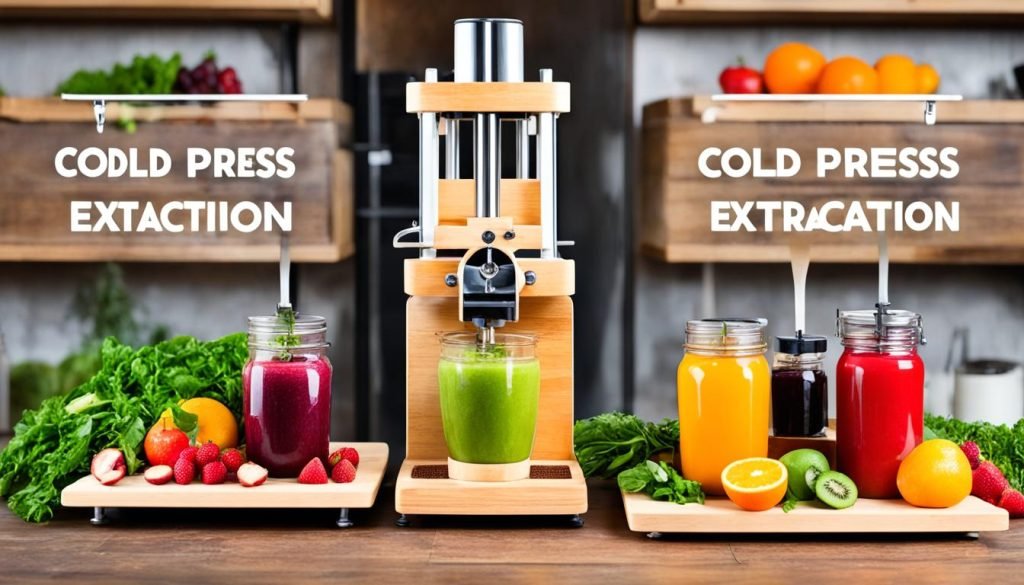What if the way you extract your juices could unlock better health benefits and preserve more nutrients than traditional methods? It's important to know about the cold press meaning for those wanting to boost their diet with nutrient-rich options. The cold press process takes juices and oils from fruits, vegetables, or seeds without heat. This keeps their vitamins, enzymes, and antioxidants intact.
Cold pressed juices are known for their fresh taste and are getting more popular with health lovers. This article will explain the details of cold press extraction. It will show why it's unique in the juice and oil world.
Key Takeaways
- Cold press meaning refers to a juice extraction method that preserves nutrients effectively.
- This technique enhances the flavor and health benefits of cold pressed juices.
- Cold press extraction is environmentally friendly, reducing the need for chemicals.
- The cold press process is popular among health enthusiasts.
- Understanding this method can lead to better dietary choices.
Understanding Cold Press Meaning
The term cold press is about a method used to make juices and oils. It keeps their important nutrients safe. Let's look into what it means and its history in different cultures.
Definition of Cold Press
Cold press means pressing raw stuff without using heat. This keeps the juice or oil's quality and nutrients. It's different from other ways because it keeps more vitamins, enzymes, and antioxidants. That's why health lovers prefer it.
Historical Context of Cold Press Methods
For a long time, cold press has been key, especially in making olive oil in the Mediterranean. These historical cold press methods go way back. Artisans used simple but effective ways to get top-quality oils.
Now, cold pressing has grown to include juices, nut butters, and more. It's mixed old ways with new tech. This has made cold press meet today's needs.
How Cold Press Extraction Works
The cold press method keeps fruits and vegetables' nutrients intact. It's clear why it's top-notch for making quality juices and oils. Let's dive into the steps of the cold press process.
The Cold Press Process Explained
The cold press process is detailed and focused on keeping nutrients safe:
- Preparation: First, fruits or veggies are cleaned and cut to get rid of dirt and prep them for juicing.
- Mastication: Then, a slow-moving juicer crushes the produce gently. This breaks down the plant cells without heating them up much.
- Hydraulic Pressing: Next, the crushed material is pressed under high pressure. This step gets the juice out while keeping it cool, unlike fast-spinning centrifugal juicers.
This method boosts juice output and keeps the taste and nutrients intact.
Machines Used in Cold Press Extraction
Special machines are key to cold press extraction. These hydraulic juicers work at slower speeds to cut down on oxidation. They're great at making juices, oils, and more that are full of nutrients. These machines are known for their quality and are different from regular juicers.

| Step | Description | Purpose |
|---|---|---|
| Preparation | Washing and chopping fruits or vegetables. | Remove impurities and ensure even processing. |
| Mastication | Grinding produce using a masticating juicer. | Break down cellular structure to facilitate juice extraction. |
| Hydraulic Pressing | Applying high pressure to extract juice. | Maximize juice yield while minimizing heat exposure. |
Cold Press Juices: What Sets Them Apart
Cold pressed juices are special because of how they are made. They have benefits that make them a good choice for your diet. This section will look at why cold pressing is better than other ways to make juice.
Benefits of Cold Pressed Juices
Cold pressed juices are great because of how they are made. This method keeps the nutrients and enzymes safe. So, these juices are:
- Richer in flavor
- Dense in nutrients
- Free of foam and sediment
These benefits make cold pressed juices a top pick for those who care about their health. Drinking them often can make you feel better and live healthier.
Comparison with Other Juice Types
When comparing cold pressed to other juices, like those made with a centrifugal juicer, we see big differences. Here's a table that shows how they differ in texture, taste, and what's in them:
| Juice Type | Texture | Taste | Nutritional Content |
|---|---|---|---|
| Cold Pressed Juices | Thicker | More intense | Higher in vitamins and enzymes |
| Centrifugal Juices | Thinner | Milder | Lower in nutrients due to oxidation |
This comparison shows that cold pressed juices taste better and are better for you. They are perfect for anyone who likes good flavor and good health.
Cold Press vs Centrifugal Juicing
Choosing between cold press and centrifugal juicing is key for those who care about their health. Each method has its own way of making juice, affecting its quality and nutrition. We'll look into how these two popular methods differ in their mechanics and nutritional values.
Mechanism Differences
Cold press juicing uses a hydraulic system to slowly extract juice without heat. This keeps nutrients fresh and makes it a top pick for health lovers. On the other hand, centrifugal juicing spins fast to cut and spin fruits and veggies. It's quicker but brings in air and heat, which can destroy nutrients fast.
Nutritional Value Comparison
When comparing cold press and centrifugal juicing, cold press wins in nutrition. It keeps more vitamins, minerals, and antioxidants, like vitamin C and phenolic compounds. Even though it takes more time and gives less juice, its better nutrition makes it a top choice for health benefits. For those focusing on nutrients, cold press's longer process means better juice quality.
FAQ
What is cold press meaning?
Cold press is a way to make juice or oil from fruits, veggies, or seeds without heat. This keeps the nutrients and makes the flavors better.
What are cold pressed juices?
Cold pressed juices come from fruits or veggies that go through the cold press method. They keep more nutrients, taste great, and are thicker than regular juices.
How does the cold press extraction process work?
First, fruits or veggies are prepared. Then, they are chewed and pressed using hydraulic pressure. This process keeps the juice from getting too hot or oxidized, saving nutrients.
What are the benefits of cold pressed juices?
Cold pressed juices keep more vitamins, minerals, enzymes, and antioxidants. They are a top pick for those who care about their health.
How do cold pressed juices compare with those made using centrifugal juicers?
Cold pressed juices taste richer and have more nutrients. They also have less oxidation. Centrifugal juices often lose nutrients because of the heat during making.
What kind of machinery is used for cold press extraction?
For cold press, hydraulic juicers are used. They work at lower speeds to cut down on oxidation and get more juice. This is different from fast centrifugal juicers.
Can you provide cold press recipes?
Yes, you can make cold press juices with fruits like apples, carrots, and greens. These recipes make refreshing drinks that are full of nutrients.
Why is cold press considered better for nutrition?
Cold press keeps the nutrients of the ingredients safe. It uses less heat and prevents oxidation. So, the juices have more vitamins and antioxidants than traditional juices.
Source Links
- Definition of COLD-PRESS – https://www.merriam-webster.com/dictionary/cold-press
- What is ‘cold-pressed' juice, and is it really better? – https://10best.usatoday.com/interests/food-culture/what-is-cold-pressed-juice-is-it-better-healthier/
- cold-pressed – https://dictionary.cambridge.org/us/dictionary/english/cold-pressed
Recent Posts
It's important to evaluate whether Beachbody On Demand continues to meet your fitness needs as we enter 2025. With a range of workout programs and nutrition plans, the platform claims to cater to...
Just like having a personal trainer at your fingertips, Beachbody On Demand offers you an extensive library of on-demand workout programs accessible anytime, anywhere. This service allows you to...

